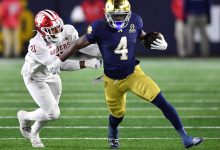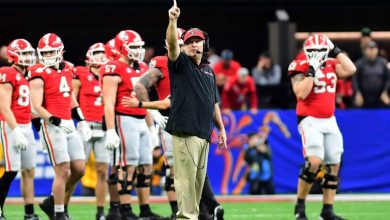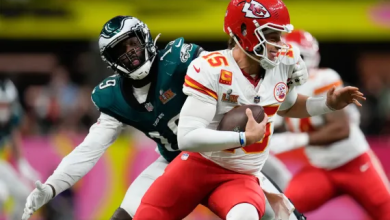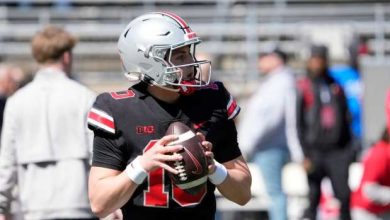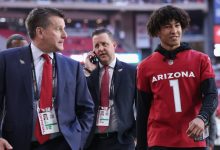Baltimore Ravens legend Ray Lewis officially voted into the Pro Football Hall of Fame.
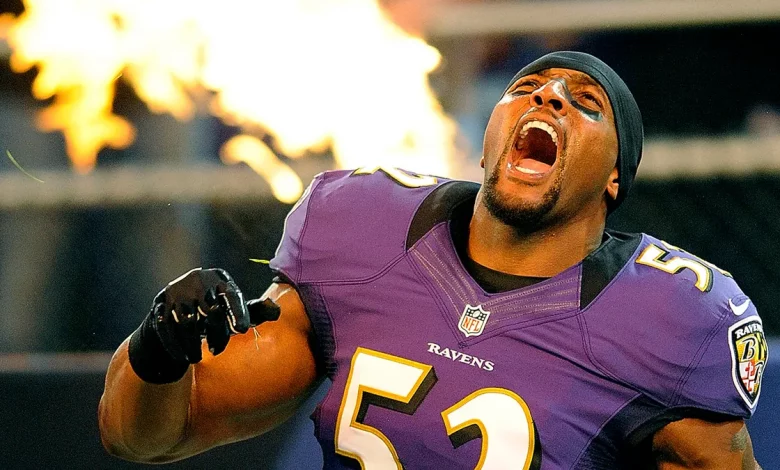
In one of the most anticipated announcements in recent memory, Ray Lewis, the legendary linebacker for the Baltimore Ravens, has officially been voted into the Pro Football Hall of Fame. Lewis, a cornerstone of the Ravens’ defense for over a decade and one of the most iconic figures in NFL history, is now immortalized as one of the greatest players ever to step on the field. This long-awaited recognition is not just a personal triumph for Lewis but also a fitting tribute to the impact he had on the game, his team, and the city of Baltimore.
For anyone who followed the NFL over the past 20 years, Ray Lewis needs no introduction. The fierce competitor, unparalleled motivator, and leader on the field was the heartbeat of the Ravens’ defense. He redefined what it meant to be a linebacker in the NFL, bringing intensity, passion, and a level of physicality that was unmatched. His style of play was not just about making tackles—it was about dominating opponents, inspiring his teammates, and creating a culture of toughness that permeated the entire franchise.
Ray Lewis was drafted by the Ravens in 1996 with the 26th overall pick in the first round of the NFL Draft. Little did the Ravens know at the time that they were securing the heart and soul of their defense for the next 17 years. Lewis would go on to spend his entire career with the Ravens, becoming the face of the franchise and establishing himself as one of the best linebackers to ever play the game.
Over the course of his career, Lewis accumulated 2,061 total tackles, which ranks him among the all-time leaders in NFL history. He also recorded 41.5 sacks, 31 interceptions, and 13 forced fumbles, proving that he was as effective in pass coverage as he was against the run. But statistics, while impressive, only tell part of the story. Lewis’s true impact can be seen in the way he carried the Ravens’ defense through the years, often making game-changing plays in crucial moments.
Perhaps his most significant achievement came in Super Bowl XXXV during the 2000 season, when the Ravens’ defense, anchored by Lewis, carried the team to its first-ever Super Bowl victory. Lewis was named Super Bowl MVP, a rare honor for a defensive player, after dominating the game with 11 tackles and an interception. His leadership on the field and his ability to rally his teammates were pivotal to the Ravens’ success, both in that Super Bowl and throughout their championship seasons.
That 2000 Ravens defense is often regarded as one of the best of all time, and Lewis was the clear leader. The defense allowed just 165 points during the regular season, the fewest in the league, and it was built around Lewis’s leadership and ability to make plays in the most critical of moments. His impact extended beyond the stats—he became the centerpiece of a defense that embodied physicality, aggression, and a refusal to back down from any challenge.
What set Ray Lewis apart from so many other great players was his leadership. He wasn’t just a player on the field—he was the Ravens’ spiritual leader and a man who demanded excellence from everyone around him. The way he prepared for games, his pregame speeches, and his intense focus made him not only a force to be reckoned with but an inspiration to all who watched him play.
Lewis had a way of elevating the players around him, making them better by simply being on the field with them. His passion for the game was contagious, and he quickly became known for his motivational speeches and his famous pregame dances. The “Ray Lewis Dance”, as it came to be known, became a part of Ravens lore, signaling not just the beginning of the game but the mindset that Lewis brought to the field: a mindset of dominance, unwavering confidence, and a refusal to lose.
One of Lewis’s most significant qualities as a leader was his ability to thrive in the most high-pressure situations. Whether it was in the Super Bowl, the playoffs, or a late-season game with playoff implications, Lewis found ways to make his presence felt when it mattered most. His clutch performances, especially in postseason games, are a testament to his mental toughness and his unshakable belief in his team.
Even when Lewis was not the fastest player on the field or the most physically gifted, his intelligence and instincts allowed him to consistently outplay his opponents. He had a unique ability to read the game, anticipate plays, and position himself to make tackles or create turnovers. His knowledge of the game and his ability to communicate with his teammates made him not just a player but a coach on the field.
Ray Lewis’s trophy case is overflowing with accolades and honors, many of which underscore the greatness of his career. Over his 17 seasons, he was selected to 13 Pro Bowls, an NFL record for linebackers at the time. He was named First-Team All-Pro seven times, cementing his place among the elite players of his generation.
In addition to his Super Bowl MVP award, Lewis was the recipient of the NFL Defensive Player of the Year award twice, in 2000 and 2003, further showcasing his dominance on the field. His career also featured two Super Bowl victories (Super Bowl XXXV and Super Bowl XLVII), the latter of which capped his remarkable career and sent him into retirement with a fitting conclusion—a Super Bowl win in his final season.
Beyond the accolades, Lewis’s name is often mentioned in the same breath as the best linebackers to ever play the game. His contemporaries included players like Brian Urlacher, Derrick Brooks, and Ray Nitschke, but Lewis’s longevity and impact on the game set him apart. Few could match his leadership, his physicality, and his ability to control the tempo of a game the way Lewis did.
Ray Lewis was the face of the Baltimore Ravens for nearly two decades, and the franchise’s identity was inseparable from his play and leadership. The Ravens were known as a hard-hitting, defensive-minded team, and much of that reputation was built around Lewis and his ability to disrupt offenses. The team’s blue-collar mentality, epitomized by Lewis’s on-field persona, became a central part of the Ravens’ brand. Lewis not only defined the Ravens’ defense but helped build the culture of the franchise, one that valued toughness, grit, and determination.
When Lewis was drafted in 1996, the Ravens were still a relatively new franchise, having moved from Cleveland to Baltimore just a few years prior. The Ravens were looking for a star, a player who could make an immediate impact, and they found that in Lewis. He became the franchise’s first true superstar, and his performances on the field helped the Ravens gain respectability in the NFL.
Under his leadership, the Ravens quickly evolved from a team searching for an identity to one of the most feared defenses in the league. Lewis set the tone with his intensity and his unyielding will to win, and his influence on his teammates was undeniable. He not only made plays on the field but also mentored young players, showing them the level of effort and commitment required to succeed at the highest level.
As the face of the Ravens for so many years, Lewis was also a central figure in the city of Baltimore. He became a community leader, known for his charitable work and his dedication to giving back to the people who supported him. His impact off the field was as significant as his achievements on it, and he became a beloved figure in the city.
Ray Lewis’s induction into the Pro Football Hall of Fame in 2023 was a long-awaited moment for both Lewis and the Ravens organization. His candidacy was a no-brainer from the moment he retired, but the waiting process only heightened the anticipation for his enshrinement. The Hall of Fame ceremony, which took place during the NFL’s 100th season celebration, was a fitting tribute to a player who had not only left an indelible mark on the game but had redefined the position of linebacker.
The enshrinement speech, delivered by Lewis himself, was filled with emotion, passion, and gratitude. Known for his fiery speeches throughout his career, Lewis’s Hall of Fame induction was no different. He spoke about the people who helped him along the way—his family, his coaches, and his teammates—and reflected on the journey that led him to the Hall of Fame.
Lewis also spoke about the significance of being enshrined with the greats of the game and how much it meant to him to represent the Ravens and the city of Baltimore. For Lewis, the honor wasn’t just about personal achievement; it was about honoring the legacy of the team and the city that embraced him from the moment he was drafted. His induction was a moment of pride not only for Lewis but for every Ravens fan who had watched him perform for years.
Ray Lewis’s legacy goes far beyond the statistics and awards. He is remembered as a player who transformed the linebacker position and who was the definition of what it meant to be a leader. His passion for the game, his ability to dominate in crucial moments, and his impact on his teammates are all elements that have made him a beloved figure in the NFL.
The Ravens’ defense may have evolved over the years, but Ray Lewis’s influence remains a defining aspect of the franchise’s identity. His name will forever be associated with the Ravens’ success, and his impact on the game will continue to inspire future generations of players. As the Ravens look toward the future, they do so with the knowledge that they are standing on the shoulders of a legend—one whose Hall of Fame career set the standard for what it means to be a Baltimore Raven.
Ray Lewis will always be more than just a Hall of Famer. He is the embodiment of what it means to be great, to be relentless, and to leave it all on the field. His enshrinement in Canton is the culmination of a career that has set the bar for all who follow, and it’s a well-deserved honor for one of the NFL’s true icons.

